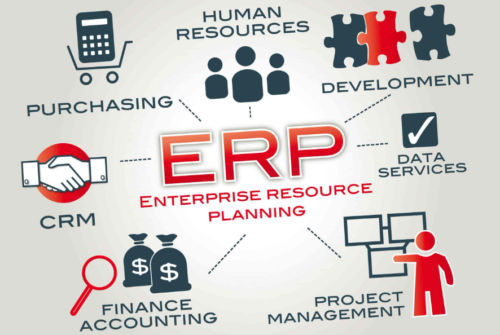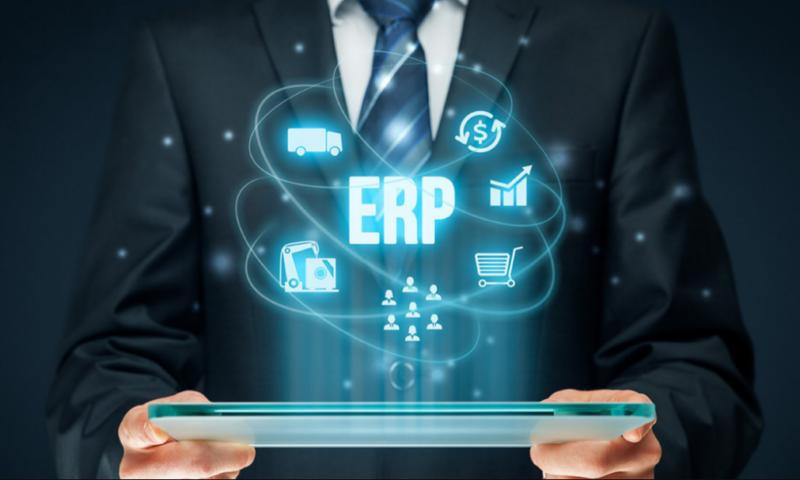Optimize your business operations with our powerful ERP program. Streamline processes and boost productivity with ease. Try it now.
In the fast-paced and ever-evolving landscape of business, staying ahead of the curve is essential for growth and sustainability. One of the most effective ways to streamline operations, enhance productivity, and improve decision-making is by implementing an Enterprise Resource Planning (ERP) program.
As we step into 2023, the significance of ERP systems has never been more pronounced. In this article, we will delve into the reasons why every business needs an ERP program in the year 2023.
In a world where businesses are constantly seeking ways to gain a competitive edge, ERP programs have emerged as powerful tools for success. These integrated software solutions offer a wide range of benefits that can transform the way organizations operate, making them indispensable in 2023 and beyond.
ERP Programs: The Key to Streamlining Your Business Operations
– Understanding ERP Programs
Enterprise Resource Planning (ERP) systems are comprehensive software solutions designed to integrate and streamline various business functions and processes. From finance and human resources to inventory management and supply chain, ERP systems provide a centralized platform for managing critical data and operations.
– Efficient Data Management
One of the primary advantages of implementing an ERP program is efficient data management. With all data stored in a centralized database, businesses can access accurate and up-to-date information at their fingertips. This ensures that decision-makers have the data they need to make informed choices, leading to better business outcomes.
Efficient data management lies at the heart of the benefits offered by an Enterprise Resource Planning (ERP) system. In a world where data is often considered the lifeblood of an organization, an ERP system plays a pivotal role in ensuring that data is not only accessible but also well-organized and utilized effectively. Here’s how an ERP system contributes to efficient data management:
Centralized Data Repository: ERP systems provide a centralized database where all crucial business data is stored. This repository includes information from various departments, such as finance, sales, inventory, and human resources. This consolidation eliminates data silos and ensures that information is readily available to authorized users.
Real-time Updates: With an ERP system in place, data is updated in real time. This means that any changes, whether it’s an inventory update or a financial transaction, are reflected immediately across the entire system. Real-time updates eliminate the need for manual data entry and reduce the risk of errors due to outdated information.
Data Accuracy and Integrity: ERP systems enforce data accuracy and integrity by setting predefined rules and validation checks. This ensures that data entered into the system is accurate and consistent. Inaccurate or duplicate data is minimized, reducing the likelihood of errors and discrepancies.
Streamlined Data Retrieval: Searching for specific data or generating reports becomes significantly easier with ERP systems. Users can quickly retrieve the information they need without having to navigate through multiple spreadsheets or databases. This streamlined data retrieval saves time and enhances productivity.
Enhanced Reporting and Analytics: ERP systems often come with built-in reporting and analytics tools. These tools allow businesses to generate a wide range of reports and gain valuable insights into their operations. From financial statements to sales forecasts, ERP systems enable data-driven decision-making.
Data Security: Data security is a top priority for ERP systems. These systems offer robust security measures to protect sensitive business information. Access controls, encryption, and audit trails are commonly implemented to safeguard data from unauthorized access or breaches.
Audit Trail and Compliance: ERP systems maintain a detailed audit trail of all data-related activities. This trail is invaluable for compliance purposes, as it provides a clear record of who accessed and modified data. This helps businesses adhere to industry regulations and internal compliance standards.
Efficient Data Backup and Recovery: ERP systems typically include data backup and recovery features. Regular backups ensure that data is not lost in the event of hardware failures, data corruption, or other unforeseen disasters. This is crucial for business continuity.
Data Retention Policies: ERP systems allow businesses to establish data retention policies. This ensures that data is kept for the required period and then disposed of in compliance with legal and regulatory requirements.
Scalability: As businesses grow, the amount of data they generate and manage also increases. ERP systems are designed to scale with the organization, accommodating growing data volumes without compromising performance or data management efficiency.
– Enhanced Collaboration
In today’s globalized business environment, collaboration is key. ERP systems facilitate collaboration by breaking down departmental silos. Employees from different departments can access the same data and collaborate seamlessly, improving communication and teamwork.
– Streamlined Business Processes
ERP programs are designed to optimize and automate business processes. This leads to increased efficiency and productivity as repetitive tasks are minimized, freeing up employees to focus on more strategic activities.
– Real-time Insights and Analytics
In 2023, data-driven decision-making is non-negotiable. ERP systems offer real-time insights and analytics, allowing businesses to monitor key performance indicators and make adjustments on the fly. This agility is crucial in responding to market changes and customer demands.
– Improved Customer Experience
Happy customers are the lifeblood of any business. ERP programs enable organizations to enhance the customer experience by providing faster response times, accurate order tracking, and personalized services.
– Compliance and Security
Data security and compliance with regulations are paramount in today’s business landscape. ERP systems often come with built-in security features and ensure data integrity, helping businesses stay compliant with industry standards and regulations.
– Cost Savings
Investing in an ERP program may seem like a significant upfront cost, but it often leads to substantial long-term savings. By streamlining operations, reducing manual errors, and optimizing inventory management, businesses can significantly cut costs.
– Scalability and Adaptability
As businesses grow, they need systems that can scale with them. ERP programs are highly scalable and adaptable, making them suitable for both small startups and large enterprises. They can grow with your business, ensuring a consistent user experience.
– Competitive Advantage
In today’s competitive landscape, gaining an edge is essential. ERP programs provide businesses with a competitive advantage by enabling them to respond faster to market changes, make data-driven decisions, and deliver exceptional customer experiences.
– Future-Proofing Your Business
The business landscape is constantly evolving. ERP programs are designed to evolve with it. By investing in an ERP system in 2023, you are future-proofing your business and ensuring its ability to adapt to whatever challenges lie ahead.
– Challenges and Considerations
While ERP programs offer numerous benefits, they also come with challenges such as implementation complexity and the need for staff training. It’s essential to consider these factors and plan accordingly.
While ERP programs offer numerous benefits, they also come with certain challenges and considerations that businesses should be aware of before implementation.
Implementation Complexity: Integrating an ERP system into your existing infrastructure can be a complex process. It often requires significant time and resources, as well as the expertise of IT professionals.
Costs: While ERP systems can lead to cost savings in the long run, the initial investment can be substantial. Businesses need to carefully assess their budget and financial resources before committing to an ERP program.
Customization: ERP systems are often highly customizable to meet the specific needs of a business. However, excessive customization can lead to complications and longer implementation times. Striking the right balance is essential.
Data Migration: Transferring existing data into the new ERP system can be challenging. Data must be accurately mapped and migrated to ensure a smooth transition without data loss or corruption.
User Training: Employees will need training to effectively use the new ERP system. This requires time and resources, and it’s crucial to ensure that staff members are comfortable with the new technology.
Change Management: Implementing ERP systems can disrupt established workflows. Businesses must have a change management strategy in place to minimize resistance and ensure a smooth transition.
Maintenance and Updates: ERP systems require regular maintenance and updates to remain effective and secure. Businesses should have a plan for ongoing system management.
Scalability: While ERP systems are scalable, businesses need to plan for future growth and ensure that the chosen ERP solution can accommodate expansion without major disruptions.
Integration with Existing Software: Compatibility with existing software applications is crucial. Ensuring that the ERP system can seamlessly integrate with other tools and systems is vital for a cohesive workflow.
Data Security and Privacy: Protecting sensitive data is a top priority. Businesses must implement robust security measures within the ERP system to safeguard against data breaches and unauthorized access.
Vendor Selection: Choosing the right ERP vendor is critical. Businesses should conduct thorough research, request references, and assess the vendor’s track record before making a selection.
Long-term Strategy: Implementing an ERP system is a long-term commitment. Businesses need to develop a clear long-term strategy for how the system will evolve and adapt to changing business needs.
– Selecting the Right ERP Solution
Choosing the right Enterprise Resource Planning (ERP) solution is a critical step in ensuring the success of your ERP implementation. There are several key factors to consider when evaluating and selecting the most suitable ERP system for your business:
Business Needs and Goals: Begin by clearly defining your organization’s specific needs and long-term goals. Consider what areas of your business require improvement and what objectives you aim to achieve with an ERP system. This foundational understanding will guide your selection process.
Budgetary Constraints: Determine your budget for ERP implementation, including both upfront costs and ongoing expenses. Be realistic about your financial resources, as ERP projects can vary significantly in cost.
Scalability: Ensure that the ERP system can scale with your business as it grows. It should accommodate increased data volume, users, and additional functionalities without major disruptions or costly upgrades.
Industry Compatibility: Some ERP solutions are tailored to specific industries, such as manufacturing, healthcare, or retail. Choose a solution that aligns with your industry’s unique requirements and compliance standards.
Customization Options: Consider the level of customization your business needs. While a highly customized ERP system can meet specific demands, it can also be more complex and expensive to maintain. Strike a balance between customization and out-of-the-box features.
User-Friendliness: An intuitive user interface is crucial for user adoption and productivity. Ensure that the ERP system is user-friendly and provides adequate training and support resources for your staff.
Integration Capabilities: Check if the ERP solution seamlessly integrates with your existing software applications and systems, including accounting software, CRM, and e-commerce platforms. Integration is essential for data flow and process automation.
Mobile Accessibility: In today’s mobile-centric world, having access to ERP data and functionalities on mobile devices is valuable. Ensure that the ERP system offers mobile compatibility or a dedicated mobile app.
Vendor Reputation: Research the ERP vendor’s reputation, customer reviews, and case studies. Contact other businesses that have implemented the same ERP solution to gain insights into their experiences.
Support and Maintenance: Understand the level of support and maintenance provided by the ERP vendor. Timely updates, troubleshooting assistance, and customer support are essential for a smooth operation.
Data Security: Data security is paramount. Ensure that the ERP system has robust security measures in place to protect sensitive business information and comply with data privacy regulations.
Future Roadmap: Inquire about the vendor’s plans for future software updates and enhancements. A vendor with a clear and ambitious roadmap can ensure that your ERP system remains relevant and competitive.
Demo and Trial: Request a demo or trial of the ERP system to test its functionality and suitability for your business firsthand. This hands-on experience can help you make an informed decision.
Frequently Asked Questions (FAQs)
1. What is an ERP program?
An ERP program, or Enterprise Resource Planning program, is a comprehensive software solution that integrates and streamlines various business functions and processes.
2. How can an ERP program improve data management?
ERP programs centralize data storage, ensuring that accurate and up-to-date information is readily accessible, leading to better decision-making.
3. What are the cost-saving benefits of ERP programs?
ERP programs can reduce costs by optimizing operations, minimizing manual errors, and improving inventory management.
4. How do ERP programs enhance collaboration?
ERP systems break down departmental silos, enabling employees from different departments to collaborate seamlessly by providing access to the same data.
5. Is it challenging to implement an ERP program?
While ERP programs offer significant benefits, they can be complex to implement. Adequate planning and staff training are essential for successful adoption.
Conclusion
In conclusion, the year 2023 presents businesses with both opportunities and challenges. To thrive in this dynamic environment, every business should consider implementing an ERP program.
These systems offer a multitude of advantages, from efficient data management to improved collaboration and customer experience. By embracing ERP technology, you’re not just staying competitive; you’re positioning your business for sustained growth and success.


